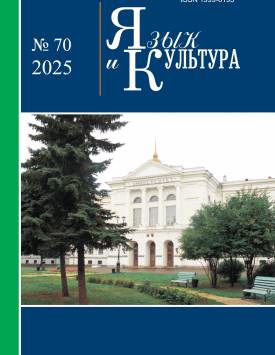Project activity in RFL classes as a technology of the socio-cultural competence formation
The successful process of teaching Russian as a foreign language assumes development of the sociocultural competence of foreign students. Most commonly, the sociocultural competence, as a part of the communicative competence, is shaped in conjunction with other competences and skills. One of the effective ways of building sociocultural competence, when teaching Russian as a foreign language, is the project method, aimed at developing a number of skills and competences and encouraging student motivation due to the possibility of individualizing the educational process. One of the key characteristics of this method is adaptability, making it practically a universal method. Currently, hybrid teaching is becoming increasingly popular, as it allows students to choose a comfortable way of learning (in or outside the learning environment), although this poses a number of tasks for teachers to improve the quality of such an educational process. The successful result of hybrid teaching of Russian as a foreign language is the formation of competences at the same level for both online and offline students, which is a complex task associated not only with the technical implementation of the teaching process, but also with the different motivation of students. The project method allows to get closer to solving this problem, which determined the relevance of this research. The goal of this article is to identify the specifics of applying the project method for development of the sociocultural competence when teaching Russian as a foreign language under different conditions. This research justifies the applicability of the project method for building sociocultural competence, broadening the minds of students and getting them more motivated to explore the culture of the target language countries on their own. The article describes application of the project method under various teaching conditions and its effectiveness in classroom teaching, distance teaching and hybrid teaching for development of the sociocultural competence. The surveys made it possible to assess the degree of development of the sociocultural competence of foreign trainees from Vietnam and China before and after applying the project method in the educational process. The article also presents classification of project tasks that can be applied in practice in hybrid, online and offline learning. The authors declare no conflicts of interests.
Keywords
sociocultural competence, project method, hybrid teaching, motivationAuthors
| Name | Organization | |
| Filippova Varvara M. | Pushkin State Russian Language Institute | vmfilippova@pushkin.institute |
| Leshutina Irina A. | Pushkin State Russian Language Institute | ialeshutina@pushkin.institute |
| Azimov Elkhan G. | Pushkin State Russian Language Institute | egazimov@pushkin.institute |
References

Project activity in RFL classes as a technology of the socio-cultural competence formation | Yazyk i Kultura – Language and Culture. 2025. № 70. DOI: 10.17223/19996195/70/13
